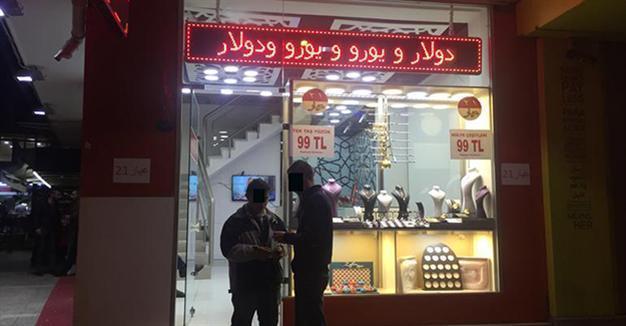Syrian gold coin traders appear in western Turkey
Banu Şen - İZMİR
 A large number of jewelry stores that reportedly engage in the illegal trade of Syrian gold coins have appeared in a western Turkish neighborhood that once hit headlines for being a hub for migrants seeking to reach Europe via the Aegean Sea.
A large number of jewelry stores that reportedly engage in the illegal trade of Syrian gold coins have appeared in a western Turkish neighborhood that once hit headlines for being a hub for migrants seeking to reach Europe via the Aegean Sea.Jewelry stores with electronic ads that read “Syrian gold coins to be traded” in Arabic but “currency exchange and jewelry” in Turkish have appeared in Basmane, a neighborhood in the city center of the Aegean province of İzmir. The stores reportedly trade Syrian gold coins, even though buying gold coins is prohibited in Turkey.
Basmane had become known as a hub for migrants seeking to reach European countries and human traffickers organizing illegal boat journeys for migrants in exchange for money, with a large number of stores selling life vests and vessel equipment. Syrians reportedly sell gold coins to these jewelry traders to pay human traffickers for boat journeys.
“We can’t sell our gold coins in Europe,” Mohamed Zakariya, a Syrian migrant who fled Damascus, was quoted as saying by daily Hürriyet. Zakariya said migrants – including himself – preparing to cross to Europe trade money and gold coins at the jewelry stores.
“These type of stores have appeared in Basmane. The migrant flow is still ongoing. We receive a lot of complaints and rumors about these stores,” İzmir Chamber of Jewelers head Turgay Baransel said.
Baransal said jewelry stores were supervised by the chamber but that supervision was limited to store showcases.
“We are not authorized to check the money cases of stores,” he added.
Baransel said jewelry stores and exchange offices could only trade gold products sealed by a printing house operating under the Prime Ministry Treasury Secretariat.
“Exchange offices can only sell gold coins sealed by the printing house, but it cannot buy them. What these stores in here are doing is unclear. What they trade is unknown. I’m calling on the Treasury Secretariat so that exchange offices and jewelry stores do their job,” he said.
“Anyone can open jewelry stores upon receiving an official document from [the İzmir] Chamber of Trade, however, most of them do not have the document. They are not able to figure whether gold coins are fake or real,” Baransel added, stressing the need for a comprehensive supervision over the stores by financial authorities.
Geographically located between war-torn Syria and Iraq in the southeast and the EU member states of Bulgaria and Greece in the northwest, Turkey has become a transition point for migrants looking to illegally cross into the EU, fleeing the violence in Iraq and Syria and seeking a higher standard of living.
The wave of migration across the Aegean Sea has often resulted in injuries and deaths due to either the capsizing of migrant-carrying boats or abuse of migrants by human traffickers.
According to a deal reached in late 2015, the European Union decided to give 3 billion euros to Turkey to tackle the Syrian refugee influx into the EU. The migrant crisis has revived the stalled relations between the 28-member-state union and Turkey as a new chapter was opened in mid-December 2015 in Turkey’s accession bid to the EU after more than two years.
Turkey, in return, has stepped up efforts to stem the migrant flow to Europe, enforcing strict controls over migrants living in western Turkey and staging operations to stop human trafficking.
An İzmir court placed arrested six people on charges of trafficking migrants seeking to cross the Aegean to the EU, including a sergeant in the Turkish Gendarmerie Command on Jan. 23.
The member of the gendarmerie, a branch of the army responsible for domestic security, is suspected of turning a blind eye to the trafficking of migrants and also tipping off traffickers about planned operations against them, private broadcaster CNNTürk said.
In exchange for his help, the sergeant identified only by the initials R.A., received bribes of $100 per migrant or $3,000 for a boatload of migrants.
















